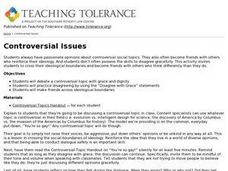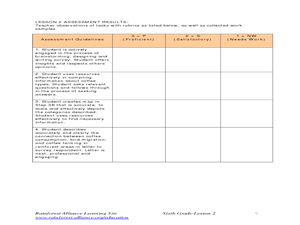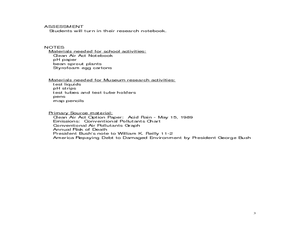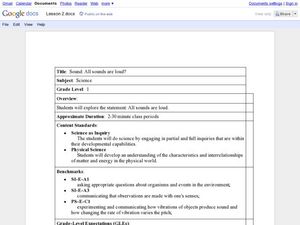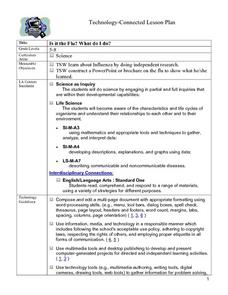American Psychological Association
Resource Vetting Rubric
How do you assure that the resources you find for your classes are of good quality? Check out a vetting rubric that suggests eight questions to ask when considering lesson plans, activities, demonstrations, and pictures for classroom use.
Lunch Lab
Exercise
This is the perfect resource for helping youngsters understand the importance of physical activity in their daily lives. The lesson and its worksheets focus on brainstorming a variety of fitness activities, such as games you can...
Curated OER
Controversial Issues
Hot topics are often engaging and can get heated. High School learners engage in an academic discussion were they must learn to engage with a person holding a different view than their own. They practice discussing different opinions...
Curated OER
Understanding Dialect as Used by Mark Twain
A reading of Mark Twain’s The Celebrated Jumping Frog of Calaveras County not only offers pupils an opportunity to practice their listening skills but also provides them with examples of dialectic speech. This is the gol’derndest lesson...
Curated OER
Human Body Riddle
The human body can be a mystery, or at least a riddle. Fifth graders pair up and use Photostory to create a riddle relating to a human body part and how it functions in the body system. They will compose a riddle, use a story board, take...
Curated OER
Does Your Field Measure Up
Young scholars measure angles using a plane table kit. In this geometry lesson, students use trigonometric identities to find the values of the length of a football field.
Constitutional Rights Foundation
Ellis Island—The “Golden Door” to America
Are you one of the 100 million Americans whose ancestors passed through the doors of Ellis Island? Learn about the historic entry point for immigrants in the late 19th and early 20th centuries with an informative reading passage. After...
Curated OER
Science with Mud!
Eighth graders give some examples of chemical reactions they see everyday. In this chemistry lesson, 8th graders investigate how much water soil can hold. They collect data and compare results with others.
Curated OER
The Case of the Missing Water
Students examine the major concepts related to the water cycle in this instructional activity. They recognize and define evaporation, condensation, precipitation and the natural cycles that occur as weather. They also participate in an...
Curated OER
Science: Spider Models
First graders create spider models to discover its anatomy. They use construction paper and sequins to make their spiders and use pictures as examples for their models. As an alternative, 1st graders make posters of the spider's parts....
Curated OER
Touching Traits
Students describe objects using only their sense of touch. In this lesson on describing characteristics, students use only their sense of touch to describe an unseen object in a box. This lesson can be used an an introduction to plant...
Curated OER
Whose Breakfast isn't for the Birds?
Students explore coffee production. In this cross-curriculum rainforest ecology lesson, students research regions where coffee comes from and investigate how the native birds in the rainforest are effected by coffee...
Curated OER
Geometry of Radio Meteor Reflections
Ninth graders investigate and describe ways that human understanding of Earth and space has depended on technological development. They describe and interpret the science of optical and radio telescopes, space probes and remote sensing...
Curated OER
CLEAN AIR ACT (1990)
Students investigate the effects of acid rain by conducting an experiment with bean sprouts and graph the results. In this Environmental Policy lesson, students visit a museum to identify examples of foreign and domestic policy on...
Curated OER
Sound: Are All Sounds Loud?
First graders explore physics by utilizing education software. In this sound properties activity, 1st graders discuss the different sounds associated with different materials and perform an object dropping experiment in class....
Curated OER
Peanut Butter Broccoli
Fifth graders explore food production by viewing DNA presentations. In this genetic engineering lesson, 5th graders discuss the foods they typically eat at home and how many common foods are engineered in a way that can produce a bigger...
Curated OER
Rock, Paper, Scissors
Fifth graders explore genetic traits. In this genetic traits lesson, 5th graders investigate dominant and recessive traits. Students identify similar traits between a parent organism and its offspring.
Curated OER
Animals
Students explore biology by participating in a science vocabulary activity. In this animal species lesson, students define a list of animal vocabulary terms as well as practice using them in sentences with the appropriate adjectives and...
Curated OER
The Next Logical Step in Astronomy
Students research future astronomy endeavors and how the exploration with contribute to astronomy and humanity. In this astronomy lesson plan, students research, present, and debate the topics as a class.
Curated OER
Bird Buffet
Fifth graders study traits of different bird beaks. In this bird lesson, 5th graders explore the function and usefulness of different inherited traits of birds.
Curated OER
Next Year's Seeds
Fifth graders explore genetic traits. In this genetic traits lesson, 5th graders discover how traits are passed from parent to offspring while examining plants. Students problem solve real world applications.
Curated OER
Simple Machines
Third graders are introduced to the six types of simple machines and discover how they make tasks easier. In groups, they rotate between stations to experiment with the different types of simple machines. To end the lesson, they make a...
Curated OER
Is It The Flu? What Do I Do?
Students use the internet to research the flu. Using various websites, they identify who should get flu shots, how to protect themselves and guidelines for getting over the flu. They write a one page report on their findings to end the...
Curated OER
Microorganism Multiplication
Sixth graders explore biology by viewing video clips in class. In this microorganism identification lesson, 6th graders identify the types of organisms that can feed small animals such as algae and protozoans. Students view video clips...


